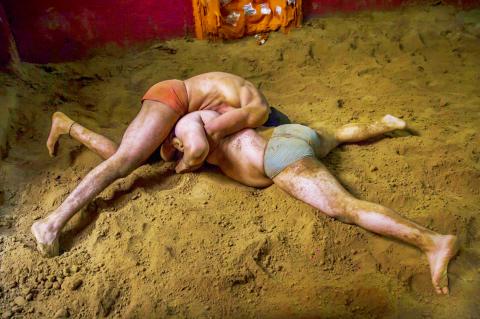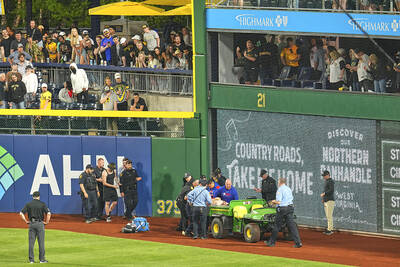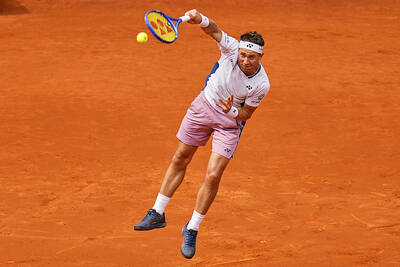Wearing nothing but loincloths, a group of boys warm up by climbing sturdy ropes that take them high into the trees. One teenager walks around the wrestling pit swirling incense, blessing the arena and preparing it for battle.
On this evening last month, as the dusk thickens and the bugs venture out, a couple of dozen young devotees of kushti, the ancient Indian style of wrestling, have gathered to face off. They range in age from 10 to 16.
The earth in the pit has been prepared as it has been for centuries, turned over and mixed with sawdust, turmeric and ghee, or clarified butter. It is mildly fragrant and soft to the touch, making it easier on the wrestlers’ skin.

Photo: AP
These devotees, or pehelwans, have made a commitment that extends beyond the hours they spend practicing each morning and evening. They live an ascetic lifestyle, eating specific foods like almond milkshakes and chapattis slathered with ghee. They do not eat meat and refrain from smoking, drinking and dating.
The sport, thought to be 2,000 years old, is mentioned in ancient Hindu texts and depicted in temple carvings. Although women wrestlers have made strides recently in India, the vast majority of participants are men.
However, like many traditions in a country that is rapidly modernizing, kushti wrestling faces the threat of being left behind. It remains popular in states like Haryana, where these pehelwans are training.
For many poor families, wrestling provides a glimmer of hope. Those who succeed can earn money, respect in their communities and even particular jobs. They are often employed in the police force or India’s railways.
Fifteen-year-old Ankur Bharadwaj says it is his dream to win an Olympic medal, like his idol Sushil Kumar, who has won two Olympic medals for India in freestyle wrestling.
Bharadwag said he gets up at 4am and jogs to the wrestling pit before going to school.
“Hard work makes a man perfect,” he said. “That’s why we are practicing so regularly. There are no breaks if you want to be a wrestler.”
Inside the pit, Bharadwaj and the other wrestlers rub their hands with the earth and toss it over their bodies. Under the watchful eye of their coach, they lock arms with their opponents, lunging for their legs as they try to flip them onto their backs and into submission.
The boys aspire to be accepted into an akhada, a kind of wrestling hostel where they are given a bed and can devote themselves to the sport full-time if they choose.
Akhadas come with shrines to the Hindu god Hanuman, who is seen as a kind of patron saint to the sport.
At dawn at a small akhada in the suburbs of Delhi, a man circles the arena dragging a thick piece of wood to smooth the earth. Another crushes almonds with a large mortar and pestle.
A poster on the gate advertises a local wrestling bout with a first-place prize of about US$3,000. The gate swings open and a cow noses its way inside, breaking into a trot when the wrestlers try to shoo it away.
Coach Hemand Kumar, 35, said wrestling has always been his passion.
Even before he started at age 10, he would get up before dawn and watch his father wrestle.
The boys who take it up are saved from “the nonsense” of the streets, he said.
However, he worries about the sport’s future in a country with a rapidly rising middle class.
“The rich kids, they don’t want to do it,” he said. “Those people who don’t have the money, they’re interested, but they don’t have the resources.”
Jai Prakash, a former Olympic wrestler who is president of the Delhi Amateur Wrestling Association, said it is getting more difficult to find the land needed to set up new akhadas, and unlike the nation’s most popular sport of cricket, it is tough to find sponsors for kushti.
“Wrestling bouts in villages used to be like the festival season, with a joyous mood and crowds celebrating victories of their favorite wrestlers,” he said.
Still, he is upbeat about the future of the sport, which is also known as pehlwani.
He said wrestling authorities want to make kushti a part of some international wrestling competitions, something he hopes might begin next year.
At the renowned Guru Hanuman Akhara in Delhi there are about 25 resident pehelwans, most of them hulking men in their 20s and early 30s.
Some train with giant clubs that they swing behind their backs. Others grab a rope that is threaded through a pulley and haul into the air a bucket that is filled with concrete.
Sitting in a chair watching the men practice is Naveen Mor, who has won a number of international wrestling fixtures, including a gold medal at the 2011 World Police and Fire Games in New York.
He said his wrestling prowess helped him land a job with the Haryana State police, where he works as an inspector.
Like many Indian wrestlers, Mor started in the pit and later became proficient wrestling on a mat, which provides the standard arena for most international bouts.
He said his first love remains the pit, where bouts can sometimes last an hour until somebody finally gives up.
As he cuts back on competitions and does more coaching, Mor said he still follows the strict dietary rules of kushti, although he is more relaxed about other rules and has recently gotten married.
He said he does not regret dedicating his youth to the sport.

Freddie Freeman homered and drove in four runs, Shohei Ohtani also went deep and Roki Sasaki earned his first major league win as the Los Angeles Dodgers beat the Atlanta Braves 10-3 on Saturday night for their seventh straight victory. The Dodgers have won the first two games of the series to improve to 5-0 against Atlanta this year. Los Angeles’ three-game sweep at home early in the season left the Braves 0-7. Sasaki allowed three runs and six hits over five innings. The 23-year-old right-hander gave up a home run to Ozzie Albies, but received plenty of offensive support in his

Bayern Munich on Sunday were crowned German champions for the 34th time, giving striker Harry Kane his first major trophy, after second-placed Bayer 04 Leverkusen drew 2-2 at SC Freiburg. Bayern’s 3-3 draw at RB Leipzig on Saturday, when the Bavarians came from two goals down to take the lead before conceding a stoppage-time equalizer, meant defending Bundesliga champions Leverkusen needed to win at Freiburg to delay the title party. Leverkusen were two goals down before scoring twice in the final 10 minutes, but Xabi Alonso’s side could not find a third, as Bayern reclaimed the title at the first attempt after

A man fell from the 6.4m-high Clemente Wall in right field at PNC Park in Pittsburgh during Wednesday night’s game between the Pirates and the Chicago Cubs. Right after Andrew McCutchen hit a two-run double in the seventh inning to put the Pirates ahead 4-3, players began waving frantically for medical personnel and pointing to the man, who had fallen onto the warning track. The fan was tended to for approximately five minutes by members of both the Pirates and Cubs training staffs as well as PNC personnel before being removed from the field on a cart. The team issued a statement shortly

PAINFUL VICTORY: Ruud said that felt pain in his rib during the warmup and was put on painkillers so that he could finish the match against Argentine Francisco Cerundolo With the help of painkillers, Casper Ruud overcame a rib ailment to defeat Francisco Cerundolo in straight sets and reach the Madrid Open final on Friday. Ruud is to face Jack Draper, who beat Lorenzo Musetti 6-3, 7-6 (4) in the other semi-final to make his third final of the year. Ruud received treatment on his rib three games into the match and went on to win 6-4, 7-5 on the Caja Magica center court. The 15th-ranked Norwegian saved 15 of the 18 break points he faced against the 21st-ranked Argentine. Ruud said he felt something in his rib during the warmup, just before